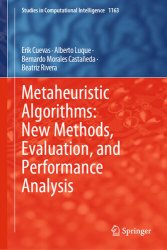 Название
Название: Metaheuristic Algorithms: New Methods, Evaluation, and Performance Analysis
Автор: Erik Cuevas, Alberto Luque, Bernardo Morales Castañeda
Издательство: Springer
Серия: Studies in Computational Intelligence
Год: 2024
Страниц: 309
Язык: английский
Формат: pdf (true), epub
Размер: 52.9 MB
This book encompasses three distinct yet interconnected objectives. Firstly, it aims to present and elucidate novel metaheuristic algorithms that feature innovative search mechanisms, setting them apart from conventional metaheuristic methods. Secondly, this book endeavors to systematically assess the performance of well-established algorithms across a spectrum of intricate and real-world problems. Finally, this book serves as a vital resource for the analysis and evaluation of metaheuristic algorithms. It provides a foundational framework for assessing their performance, particularly in terms of the balance between exploration and exploitation, as well as their capacity to obtain optimal solutions. Collectively, these objectives contribute to advancing our understanding of metaheuristic methods and their applicability in addressing diverse and demanding optimization tasks. The materials were compiled from a teaching perspective. For this reason, the book is primarily intended for undergraduate and postgraduate students of Science, Electrical Engineering, or Computational Mathematics.
Metaheuristic methods are powerful problem-solving techniques that are widely used in optimization when dealing with complex, high-dimensional, or computationally expensive problems. These methods provide a general framework for exploring and refining potential solutions to find near-optimal or optimal solutions in large solution spaces. Unlike traditional optimization algorithms that rely on specific mathematical models or problem structures, metaheuristics are more versatile and adaptable. They draw inspiration from natural processes and phenomena, such as evolution, simulated annealing, or swarm behavior, to guide the search for solutions. By iterative refining and exploring solutions while escaping local optima, metaheuristics can effectively tackle a wide range of optimization challenges across various domains, making them valuable tools for addressing real-world problems where traditional approaches may be impractical or insufficient.
There is no universal metaheuristic method capable of outperforming all problems across the spectrum of optimization challenges. Hence, the continual introduction of new algorithms is of paramount importance. By innovating and developing new methods and mechanisms, we can explore novel strategies that break away from traditional paradigms. These new approaches help us adapt to the unique characteristics and complexities of specific problems, offering tailored solutions that improve efficiency and effectiveness.
The analysis of metaheuristic methods is difficult for several reasons. Metaheuristic algorithms are inherently stochastic and non-deterministic. They rely on randomization or probabilistic components, making their behavior unpredictable to some extent. This randomness can make it difficult to precisely analyze their performance and behavior. Many metaheuristic algorithms are complex and involve intricate mechanisms for exploring the solution space. Analyzing such complexity mathematically can be challenging and may require advanced techniques and tools. Metaheuristics are designed to be adaptable to various optimization problems. As a result, their performance can depend significantly on problem-specific characteristics. Analyzing their behavior across different problem instances becomes a complex task, as there is no one-size-fits-all analysis. Metaheuristic methods often have numerous parameters that need to be tuned for optimal performance. The sensitivity of these algorithms to parameter settings adds another layer of complexity when analyzing and optimizing them.
Скачать Metaheuristic Algorithms: New Methods, Evaluation, and Performance Analysis
[related-news]
[/related-news]